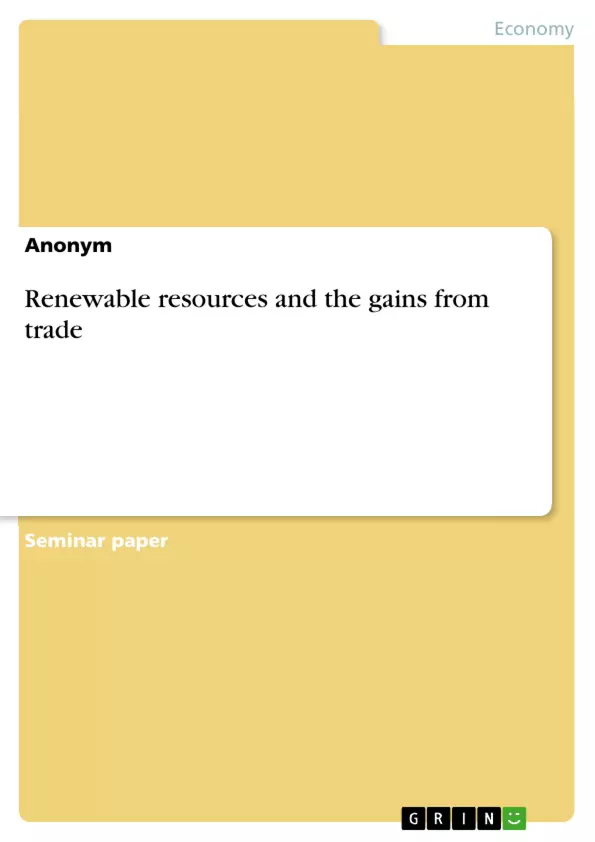Expansion and liberalization of world trade lasted for ages at the expense of the natural environment. In 2013, the financial volume of world trade amounted to 23.4 trillion US $, about a third of world GDP. At the same time, global environmental indicators show the impact of trade on the environment. Population growth and rising incomes fuel the demand for goods and services, which is often met by natural resources, especially land and water. Tripling of the world population over the last six decades and fourfold the increase in GDP expected by 2050, were only some of the factors affecting on the growth of trade. These trends led to an increasing number of ecosystems in the world far beyond their service potential. For example, global demand for food is expected to double between today and 2050 year. By this time, it is estimated that 3.9 billion people or 40% of the projected world population will live in countries that are availability of just 1,000 liters of water per person per year. To reverse these trends, trade should be used as a catalyst for positive economic, social and ecological change, and not as a factor of environmental degradation.
Some of the natural resources fulfill the role of living conditions of people. This also includes resources for recreation, treatment, and training. The rest serve the needs of industry. There are such a types of natural resources: By type of use. By the nature of the natural components. If possible, recovery. Inexhaustible types of natural resources are: water, cosmic,climatic. Natural resources are classified into practically inexhaustible and exhaustible. The latter are divided into renewable and non-renewable. The dividing line is conditional. Practically inexhaustible are the resources whose existence is not limited by time frames. At any intensity of their consumption, the quantity at the disposal of mankind does not decrease or decrease so insignificantly that in practice this magnitude can be neglected. Such resources include solar radiation, hydro- and wind energy potential, etc.
Inhaltsverzeichnis (Table of Contents)
- Introduction
- The terms of renewable resources and gains from trade
- The model
- Economic development and a gains from trade
- Conclusion
- References:
Zielsetzung und Themenschwerpunkte (Objectives and Key Themes)
This text aims to analyze the impact of trade on the environment and explore how to utilize trade as a catalyst for positive change, promoting economic, social, and ecological sustainability. It examines the concept of renewable resources, gains from trade, and their impact on economic development.
- The environmental impact of trade and its influence on renewable resources.
- The concept of gains from trade and its relationship with resource management.
- The role of renewable resources in economic activity and well-being.
- The importance of knowledge, aspiration, and opportunities for sustainable resource management.
- The economic and environmental consequences of inaccurate information on natural resources.
Zusammenfassung der Kapitel (Chapter Summaries)
- Introduction: This chapter introduces the topic of trade and its impact on the environment, highlighting the growing demand for goods and services driven by population growth and increasing incomes. It argues for a shift in trade practices to promote environmental sustainability.
- The terms of renewable resources and gains from trade: This chapter delves into the definition and classification of natural resources, particularly renewable resources. It explains the concept of gains from trade, emphasizing its potential for economic benefits through specialization and comparative advantage.
- The model: This chapter presents the concept of a green economy as a model for sustainable development, focusing on the importance of renewable resources for economic activity and well-being. It highlights the need for knowledge, aspiration, and opportunities for effective resource management.
- Economic development and a gains from trade: This chapter examines the relationship between economic development and gains from trade, focusing on the importance of accurate information on natural resources for informed decision-making. It discusses the potential for economic and environmental costs associated with inaccurate or incomplete information about resources.
Schlüsselwörter (Keywords)
This text focuses on the key concepts of trade, environment, renewable resources, gains from trade, economic development, sustainability, green economy, natural capital, information, and decision-making.
Frequently Asked Questions
How does world trade impact the natural environment?
Expansion and liberalization of trade have often occurred at the expense of ecosystems, driving demand for land and water beyond their service potential as population and incomes grow.
What is the difference between exhaustible and inexhaustible resources?
Inexhaustible resources, like solar radiation and wind energy, do not decrease significantly with use. Exhaustible resources are limited and divided into renewable and non-renewable categories.
What are the 'gains from trade' in relation to resources?
Gains from trade refer to economic benefits achieved through specialization and comparative advantage, which can potentially fund social and ecological improvements if managed sustainably.
What role does a 'green economy' play in sustainable development?
A green economy focuses on using renewable resources to drive economic activity while maintaining well-being and reducing environmental degradation.
Why is accurate information on natural resources important for trade?
Inaccurate information can lead to economic and environmental costs, as decision-makers may overexploit resources or fail to implement necessary conservation measures.
- Quote paper
- Anonym (Author), 2018, Renewable resources and the gains from trade, Munich, GRIN Verlag, https://www.grin.com/document/437997



